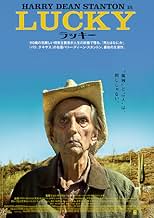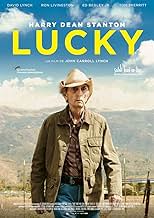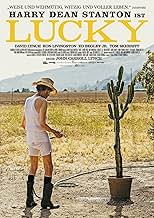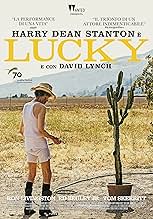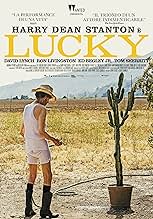AVALIAÇÃO DA IMDb
7,3/10
28 mil
SUA AVALIAÇÃO
Lucky segue a jornada espiritual de um ateu de 90 anos e os personagens peculiares que habitam sua cidade deserta e fora do mapa.Lucky segue a jornada espiritual de um ateu de 90 anos e os personagens peculiares que habitam sua cidade deserta e fora do mapa.Lucky segue a jornada espiritual de um ateu de 90 anos e os personagens peculiares que habitam sua cidade deserta e fora do mapa.
- Direção
- Roteiristas
- Artistas
- Prêmios
- 17 vitórias e 19 indicações no total
Pam Sparks
- Pam
- (as Pamela Sparks)
Ulysses Olmedo
- Juan Wayne
- (as Ulysses Olemdo)
- Direção
- Roteiristas
- Elenco e equipe completos
- Produção, bilheteria e muito mais no IMDbPro
Avaliações em destaque
2017 saw the passing of both Harry Dean Stanton and Sam Shepard, two-thirds of the creative triumvirate behind the classic 1984 road movie / western PARIS, TEXAS. Wim Wenders and Shephard contrived to give Stanton - a career character actor - one of the greatest roles in twentieth century cinema and he owned every guilt-ridden moment of that film. John Carroll Lynch, in many ways a modern day Stanton, uses his directorial debut to showcase the ninety-year-old Stanton's formidable cussedness and aching vulnerability in a way that is as perfect a bookend to an acting career as GRAN TORINO was to Clint Eastwood.
LUCKY is a deceptively simple tale of a determinedly alone old naval officer, who has got to the stage in life where even his doctor (a fabulous cameo from Ed Begley Jr.) has nothing to tell him when he takes a dizzy tumble. This is an old man, going about things the only way he knows how. His days are a series of little routines sparingly conveyed through repetition and variation in the first half of the film. He knows he is going to die, he knows this scares him, but he also knows there is little else he can do other than persist, like the best of Samuel Beckett's characters.
There is something a little reminiscent of another Wenders' film in LUCKY, namely LIGHTNING OVER WATER. In that part-documentary, Wenders' sought to approach his own fear of death through the imminent mortality of veteran Hollywood filmmaker and close friend Nicholas Ray. Carroll Lynch is similarly engaging with the genuine fears of vulnerabilities of the ageing Stanton, as a means of tapping in to a wider understanding of what death is and what it means.
The film vacillates between profound human empathy and a less appealing, although far less prominent, sentimentality. It is often at its strongest in the barroom scenes in which Lucky goes through the motions of his compromised masculinity and desperately rails against and longs for the reckoning that remains a few miles further down the road. Carroll Lynch keeps the overall tone light and as sunny as the Californian landscape that his film cleaves to, which only makes moments like when Stanton lets rip with a Mariachi band all the more poignant, urgent and arresting. With some great supporting turns from the likes of David Lynch, Tom Skerritt and Ron Livingston, this perfectly formed, smallscale movie, has much bigger concerns at its heart.
LUCKY is a deceptively simple tale of a determinedly alone old naval officer, who has got to the stage in life where even his doctor (a fabulous cameo from Ed Begley Jr.) has nothing to tell him when he takes a dizzy tumble. This is an old man, going about things the only way he knows how. His days are a series of little routines sparingly conveyed through repetition and variation in the first half of the film. He knows he is going to die, he knows this scares him, but he also knows there is little else he can do other than persist, like the best of Samuel Beckett's characters.
There is something a little reminiscent of another Wenders' film in LUCKY, namely LIGHTNING OVER WATER. In that part-documentary, Wenders' sought to approach his own fear of death through the imminent mortality of veteran Hollywood filmmaker and close friend Nicholas Ray. Carroll Lynch is similarly engaging with the genuine fears of vulnerabilities of the ageing Stanton, as a means of tapping in to a wider understanding of what death is and what it means.
The film vacillates between profound human empathy and a less appealing, although far less prominent, sentimentality. It is often at its strongest in the barroom scenes in which Lucky goes through the motions of his compromised masculinity and desperately rails against and longs for the reckoning that remains a few miles further down the road. Carroll Lynch keeps the overall tone light and as sunny as the Californian landscape that his film cleaves to, which only makes moments like when Stanton lets rip with a Mariachi band all the more poignant, urgent and arresting. With some great supporting turns from the likes of David Lynch, Tom Skerritt and Ron Livingston, this perfectly formed, smallscale movie, has much bigger concerns at its heart.
Lucky is both eerie and alluring in that it hasn't just turned out to be Harry Dean Stanton's swan song, it's as if all of those involved in the making of it were watching the Grim Reaper approach Mr. Stanton from a distance during filming.They were certainly aware - and impressed - that he was 90 years old. There's not a bad performance in the whole film; everyone gives a thoughtful, elegant performance as if there is no room for childishness in the presence of the approaching death of their friend. Surely Mr. Stanton could feel to the core that his days were numbered, and wow did that make for an eloquent performance in a role perfectly suited for him. Despite Lucky being a film about the waning of life, it's not a morose film; the message seems to be that while death is scary, you can still smile at it, and still smile till the end. And while you lose some liveliness as you grow old, that doesn't mean that you have to lose your feistiness. As much as I enjoyed Lucky, I also believe that a good filmmaker could have followed almost any old man for a few weeks with a video camera and come up with an equally interesting film. Lucky is essentially one down-to-earth old man's tale of a rather unexciting present-day life, and that's about it...but maybe that's special in itself. Still, I didn't see a whole lot that was fantastic about it beyond Mr. Stanton's performance. But there's no denying that it's a well-made film, with poignant and sometimes amusing moments, moving stories from the distant past, and many good shots of the desolate, solitary desert.
In terms of humanity, Lucky is the simplest story I've ever connected to. Seeing it in theaters was one of the most emotional experiences I've ever had watching a movie.
Lucky walks the thin line between being an exploration of death and a celebration of life, because it manages to be both. Lucky is a character that at first couldn't care less about his mortality. He didn't think about it because he didn't have to. But when the effects of old age start to set in, Lucky can't help but see his own death everywhere. With the onset of this fear, he learns to embrace death - "realism", as said in the movie. However, this process was not so easy, as he first had to let go of his anger to understand the beauty and sadness in the experience of his whole life up until his old age, and everything he has yet to be a part of.
Many try to claim that movies "used to be simpler" and "had better stories" due to less technology, but I'll be damned if they aren't easier to connect to now than ever. Lucky follows suit of movies, loosely like "Manchester by the Sea", and greatly like "Paterson" which both came out within the past year. These movies pay homage to real life by stripping the substance down to normal human experiences that most end up having to face, and everyone can at least recognize. In particular, Lucky is that of accepting how everything in life will go away in time, so all that can be done is to experience it. This ephemeral experience of life is both beautiful and sad, as this movie is both about life and death.
The reason that a movie like Lucky hit me so hard was because it threw nothing in my face. I was so immersed in what felt like real life to me that it was as sudden as extreme as life can be when all the sudden it got so emotional, like in the bar. Lucky's stance in the bar, letting go and explaining his stance as a human being was one of the most emotionally moved I've ever been by a single scene. Again, this is because everything develops so naturally, and because I personally connect with what Stanton's character has to find his way back to after 90 some years of age - being able to smile. While all aspects of the filmmaking delivered this effect, I especially recognize the script and Stanton's performance for their organic emotional accomplishment within the story.
To me, Lucky owns up to the internal and external unknown. It represents the ongoing process of learning how to smile in a life that will continue to break you down.
Lucky walks the thin line between being an exploration of death and a celebration of life, because it manages to be both. Lucky is a character that at first couldn't care less about his mortality. He didn't think about it because he didn't have to. But when the effects of old age start to set in, Lucky can't help but see his own death everywhere. With the onset of this fear, he learns to embrace death - "realism", as said in the movie. However, this process was not so easy, as he first had to let go of his anger to understand the beauty and sadness in the experience of his whole life up until his old age, and everything he has yet to be a part of.
Many try to claim that movies "used to be simpler" and "had better stories" due to less technology, but I'll be damned if they aren't easier to connect to now than ever. Lucky follows suit of movies, loosely like "Manchester by the Sea", and greatly like "Paterson" which both came out within the past year. These movies pay homage to real life by stripping the substance down to normal human experiences that most end up having to face, and everyone can at least recognize. In particular, Lucky is that of accepting how everything in life will go away in time, so all that can be done is to experience it. This ephemeral experience of life is both beautiful and sad, as this movie is both about life and death.
The reason that a movie like Lucky hit me so hard was because it threw nothing in my face. I was so immersed in what felt like real life to me that it was as sudden as extreme as life can be when all the sudden it got so emotional, like in the bar. Lucky's stance in the bar, letting go and explaining his stance as a human being was one of the most emotionally moved I've ever been by a single scene. Again, this is because everything develops so naturally, and because I personally connect with what Stanton's character has to find his way back to after 90 some years of age - being able to smile. While all aspects of the filmmaking delivered this effect, I especially recognize the script and Stanton's performance for their organic emotional accomplishment within the story.
To me, Lucky owns up to the internal and external unknown. It represents the ongoing process of learning how to smile in a life that will continue to break you down.
Lucky is the directorial debut of prolific actor John Carroll Lynch, who has worked with everyone from John Woo to David Fincher to Martin Scorsese, and appeared in recurring roles on TV shows such as The Drew Carey Show (1995), Carnivale (2003), and História de Horror Americana (2011). However, more noteworthy than this is that Lucky features the last performance from the legendary Harry Dean Stanton, who was 90 at the time of shooting, and who died on September 15, 2017, two weeks prior to the film's North American release. Written specifically for Stanton by Logan Sparks (one of his closest friends) and Drago Sumonja, the film is a meditation on mortality, and is as much about Stanton himself as it is the eponymous character he's playing. Beginning like a quirky comedy full of strange characters with gentle eccentricities (imagine a David Lynch film softened by John Waters), the film later morphs into a more serious meditation on how a nonagenarian atheist with no family faces up to the fact that death is not that far away. Moving entirely at its own measured pace, the film manages to explore a plethora of themes along the way; mortality, routine, impermanence, friendship, love, loss, regret, hope. Laid back and tender, graceful and sedate, Lucky works primarily by way of presenting individual vignettes that very much add up to more than the sum of their parts.
The film tells the story of Lucky (Stanton), a 90-year-old living in an unnamed backwater town on the edge of an Arizonan desert. An atheist who doesn't believe in an afterlife or the soul, never married, and with no children, he is happy to explain to people that he's alone, but he is not lonely. Living his life by way of a rigid routine, Lucky's day begins with yoga exercises, followed by a walk to the local diner, where he chats with owner Joe (Barry Shabaka Henley) and waitress Loretta (Yvonne Huff Lee), and completes the crossword in the paper. Visiting the local shop run by Bibi (Bertila Damas), he buys a pack of cigarettes, and then returns home to spend a few hours watching game shows. At night, he heads to a bar owned by Elaine (Beth Grant) and her husband Paulie (James Darren), where he trades stories with his best friend, Howard (David Lynch; yes, that David Lynch), and barman Vincent (Hugo Armstrong). However, when he falls for no apparent reason one morning, the local doctor, Kneedler (Ed Begley Jr.), tries to explain that at his age, the body simply starts to break down. On the other hand, Kneedler is unable to find anything seriously wrong with him, despite his nicotine addiction, pointing out that trying to get him off cigarettes would probably do him more harm than good. Meanwhile, he continues with his routine, albeit more aware that he doesn't have a huge amount of time left. Over the next few days, he attends Bibi's son's birthday party, encounters life-insurance man Bobby (Ron Livingston), who he feels is exploiting Howard, and trades stories from the Battle of Okinawa with former marine Fred (Tom Skerritt).
And that's about it. That's the plot (if you can even call it that), and it should be obvious that this is a character-driven film, where the vagaries of a well-laid plot simply don't factor into things. That this is the case is signalled in the slow and methodical opening sequence, which depicts Lucky ambling past boarded-up and dust covered shops, as the hot sun beats down. This is an especially well-handled example of form and content mirroring one another, as the lethargic pace playing out on screen (no one ever seems to be in a rush) correlates with the lethargic pace of the editing rhythm (Lynch allows the scenes and the characters plenty of room to breathe, unburdened with trying to race to the next pivotal plot-point).
This sequence also works to set up the style and tone which the film will adopt for the remainder of its runtime. Rather than a standard cause-and-effect narrative, Lucky is instead built upon a series of small, usually idiosyncratic, moments, often with only the barest amount of connective tissue between them. Neither does Lucky, nor any of the other characters, have what you would call a significant character arc. He doesn't encounter something which forces him to go on a metaphorical/spiritual journey, arriving at some kind of universal truth which softens his gruff exterior. Instead, he's essentially the same man when the film ends as he was when it began, which is, of course, the entire point.
Also in the opening sequence, prior to seeing Lucky wandering around town, the film features a series of shots of the barren desert, with a tortoise slowly ambling into view. The film then cuts to Lucky waking up. This could have been a trite metaphor, but in actual fact, this tortoise becomes a plot-point later on; his name is President Roosevelt, and he belongs to Howard. However, he recently escaped from Howard's yard, sending the man into an emotional meltdown, as Roosevelt is his oldest friend. The missing tortoise is one of the few strands which occurs over multiple scenes, and is central to the way the film defines Howard's character, whilst Lucky's incredulity that Howard could be so upset over a tortoise affords him the opportunity for some nihilistic philosophising.
Indeed, in relation to philosophy/theology, Lucky's atheism is an important component of his character; he doesn't believe in God, an afterlife, or the soul, arguing instead that we only get one life, the corporeal one, and when we die, that's it, we turn to dust, and we're gone forever. However, as Lucky starts to become more and more conscious of the imminence of death, his darkly existentialist outlook starts to look less like a grumpy old man's innocent ramblings, and more like something which could genuinely make his last few years miserable. In relation to this, when Lucky goes to see Kneedling, the doctor stresses the fact that he is both blessed and cursed to have gotten as old as he has - blessed in the sense that very few people make it this far, cursed because physically, Lucky's body is beginning to fail him.
One of the major themes in the film is routine; Lucky's day is rigidly mapped out, to the point that if someone is sitting in his favourite diner seat, it throws him off and puts him in a bad mood. In this sense, repetition is a major part of both Lucky's life, and the film's structure (for example, we see him walking his route around town on four different occasions). Another important theme is impermanence, which ties into Lucky's rejection of a never-ending life after death. For example, when he visits a pet shop, he doesn't know what a "forever home" is, and even when it's explained to him, he still seems to be somewhat confused. Tied to this, the issue of mortality is brought up time and again, seen most clearly in Howard's dealings with Bobby, preparing for his own inevitable death. Indeed, it's worth pointing out that the five yoga exercises Lucky performs each morning are the Five Rites of Rejuvenation, so although he knows this life won't last forever, so too is he doing what he can to prolong it as much as possible. With this in mind, after he falls, the film shifts gears, changing from a pseudo-comic examination of a curmudgeonly old man into a subtle analysis of the inescapability of death and the transitory nature of existence.
The film also deals with the importance of small anecdotes and seemingly minor personal connections - scenes which aren't especially dramatic, but which tell us a huge amount about the characters. Working together, the acting, the expressive faces, the seemingly insignificant dialogue, the importance of routine, the crumbling town, the desert, all serve to create the whole, which conveys far more than any one aspect of the film could. However, this is not to say that individual scenes don't work, or are disposable. For example, several scenes contain achingly beautiful anecdotes; Lucky's story of accidentally killing a mockingbird as a child; Howard's narration of what he imagines President Roosevelt's birth must have been like; and, in a scene obviously paying homage to a very similar scene in Uma História Real (1999), Lucky and Fred swap heart-breaking stories of their time in the war (just like Lucky, Stanton was a cook on board the USS LST-970, which participated in the Battle of Okinawa). The film also contains one of the best lines I've heard in a long time - as Paulie is talking about how he used to be a bum worth nothing, but everything changed after he met Beth, he explains, "I'm still nothing, but now I have everything. Isn't that something?"
If I was to find fault, there would be a couple of things worth criticising. Although the film avoids mawkish sentimentality for almost its entire runtime, it does become a little maudlin towards the end. Additionally, by its very nature, the narrative is very episodic, which creates a slight impression of disconnection. For the most part, the tone and design of the film also work to keep the audience at arm's length, preventing us from becoming too emotionally involved with Lucky himself, something which I'm not entirely sure served the film, or the character, very well.
However, these are relatively minor flaws in an otherwise excellent film, and in the end, this is a fitting swan song for an actor of Stanton's calibre. And how many people can say they've appeared in their own filmic obituary?
The film tells the story of Lucky (Stanton), a 90-year-old living in an unnamed backwater town on the edge of an Arizonan desert. An atheist who doesn't believe in an afterlife or the soul, never married, and with no children, he is happy to explain to people that he's alone, but he is not lonely. Living his life by way of a rigid routine, Lucky's day begins with yoga exercises, followed by a walk to the local diner, where he chats with owner Joe (Barry Shabaka Henley) and waitress Loretta (Yvonne Huff Lee), and completes the crossword in the paper. Visiting the local shop run by Bibi (Bertila Damas), he buys a pack of cigarettes, and then returns home to spend a few hours watching game shows. At night, he heads to a bar owned by Elaine (Beth Grant) and her husband Paulie (James Darren), where he trades stories with his best friend, Howard (David Lynch; yes, that David Lynch), and barman Vincent (Hugo Armstrong). However, when he falls for no apparent reason one morning, the local doctor, Kneedler (Ed Begley Jr.), tries to explain that at his age, the body simply starts to break down. On the other hand, Kneedler is unable to find anything seriously wrong with him, despite his nicotine addiction, pointing out that trying to get him off cigarettes would probably do him more harm than good. Meanwhile, he continues with his routine, albeit more aware that he doesn't have a huge amount of time left. Over the next few days, he attends Bibi's son's birthday party, encounters life-insurance man Bobby (Ron Livingston), who he feels is exploiting Howard, and trades stories from the Battle of Okinawa with former marine Fred (Tom Skerritt).
And that's about it. That's the plot (if you can even call it that), and it should be obvious that this is a character-driven film, where the vagaries of a well-laid plot simply don't factor into things. That this is the case is signalled in the slow and methodical opening sequence, which depicts Lucky ambling past boarded-up and dust covered shops, as the hot sun beats down. This is an especially well-handled example of form and content mirroring one another, as the lethargic pace playing out on screen (no one ever seems to be in a rush) correlates with the lethargic pace of the editing rhythm (Lynch allows the scenes and the characters plenty of room to breathe, unburdened with trying to race to the next pivotal plot-point).
This sequence also works to set up the style and tone which the film will adopt for the remainder of its runtime. Rather than a standard cause-and-effect narrative, Lucky is instead built upon a series of small, usually idiosyncratic, moments, often with only the barest amount of connective tissue between them. Neither does Lucky, nor any of the other characters, have what you would call a significant character arc. He doesn't encounter something which forces him to go on a metaphorical/spiritual journey, arriving at some kind of universal truth which softens his gruff exterior. Instead, he's essentially the same man when the film ends as he was when it began, which is, of course, the entire point.
Also in the opening sequence, prior to seeing Lucky wandering around town, the film features a series of shots of the barren desert, with a tortoise slowly ambling into view. The film then cuts to Lucky waking up. This could have been a trite metaphor, but in actual fact, this tortoise becomes a plot-point later on; his name is President Roosevelt, and he belongs to Howard. However, he recently escaped from Howard's yard, sending the man into an emotional meltdown, as Roosevelt is his oldest friend. The missing tortoise is one of the few strands which occurs over multiple scenes, and is central to the way the film defines Howard's character, whilst Lucky's incredulity that Howard could be so upset over a tortoise affords him the opportunity for some nihilistic philosophising.
Indeed, in relation to philosophy/theology, Lucky's atheism is an important component of his character; he doesn't believe in God, an afterlife, or the soul, arguing instead that we only get one life, the corporeal one, and when we die, that's it, we turn to dust, and we're gone forever. However, as Lucky starts to become more and more conscious of the imminence of death, his darkly existentialist outlook starts to look less like a grumpy old man's innocent ramblings, and more like something which could genuinely make his last few years miserable. In relation to this, when Lucky goes to see Kneedling, the doctor stresses the fact that he is both blessed and cursed to have gotten as old as he has - blessed in the sense that very few people make it this far, cursed because physically, Lucky's body is beginning to fail him.
One of the major themes in the film is routine; Lucky's day is rigidly mapped out, to the point that if someone is sitting in his favourite diner seat, it throws him off and puts him in a bad mood. In this sense, repetition is a major part of both Lucky's life, and the film's structure (for example, we see him walking his route around town on four different occasions). Another important theme is impermanence, which ties into Lucky's rejection of a never-ending life after death. For example, when he visits a pet shop, he doesn't know what a "forever home" is, and even when it's explained to him, he still seems to be somewhat confused. Tied to this, the issue of mortality is brought up time and again, seen most clearly in Howard's dealings with Bobby, preparing for his own inevitable death. Indeed, it's worth pointing out that the five yoga exercises Lucky performs each morning are the Five Rites of Rejuvenation, so although he knows this life won't last forever, so too is he doing what he can to prolong it as much as possible. With this in mind, after he falls, the film shifts gears, changing from a pseudo-comic examination of a curmudgeonly old man into a subtle analysis of the inescapability of death and the transitory nature of existence.
The film also deals with the importance of small anecdotes and seemingly minor personal connections - scenes which aren't especially dramatic, but which tell us a huge amount about the characters. Working together, the acting, the expressive faces, the seemingly insignificant dialogue, the importance of routine, the crumbling town, the desert, all serve to create the whole, which conveys far more than any one aspect of the film could. However, this is not to say that individual scenes don't work, or are disposable. For example, several scenes contain achingly beautiful anecdotes; Lucky's story of accidentally killing a mockingbird as a child; Howard's narration of what he imagines President Roosevelt's birth must have been like; and, in a scene obviously paying homage to a very similar scene in Uma História Real (1999), Lucky and Fred swap heart-breaking stories of their time in the war (just like Lucky, Stanton was a cook on board the USS LST-970, which participated in the Battle of Okinawa). The film also contains one of the best lines I've heard in a long time - as Paulie is talking about how he used to be a bum worth nothing, but everything changed after he met Beth, he explains, "I'm still nothing, but now I have everything. Isn't that something?"
If I was to find fault, there would be a couple of things worth criticising. Although the film avoids mawkish sentimentality for almost its entire runtime, it does become a little maudlin towards the end. Additionally, by its very nature, the narrative is very episodic, which creates a slight impression of disconnection. For the most part, the tone and design of the film also work to keep the audience at arm's length, preventing us from becoming too emotionally involved with Lucky himself, something which I'm not entirely sure served the film, or the character, very well.
However, these are relatively minor flaws in an otherwise excellent film, and in the end, this is a fitting swan song for an actor of Stanton's calibre. And how many people can say they've appeared in their own filmic obituary?
Please disregard that review by an IMDb user who claims to "Crave intellectual depth" but is clearly unable to recognize it, and cannot see beyond the superficial.
It proves what Lucky says in the film: "I always thought that the one thing we could agree on is what we were looking at...but that's bullshit, because what I see isn't what you see."
Mr. Stanton's powerful, truth-telling performance is at turns heartbreaking, uplifting, hilarious, and inspiring.
Please do yourself a favor and see this very special film.
It proves what Lucky says in the film: "I always thought that the one thing we could agree on is what we were looking at...but that's bullshit, because what I see isn't what you see."
Mr. Stanton's powerful, truth-telling performance is at turns heartbreaking, uplifting, hilarious, and inspiring.
Please do yourself a favor and see this very special film.
Você sabia?
- CuriosidadesShot in eighteen days.
- Erros de gravaçãoWhen he goes to the convenience store to buy 1/2 gallon of milk he gives the clerk a 10 dollar bill and she gives him 25 cents change.
- ConexõesFeatured in Fandor: Why Harry Dean Stanton Is The G.O.A.T. Character Actor (2017)
- Trilhas sonorasCon El Tiempo Y Un Ganchito
Written by Genaro Nunez
Performed by Pedro Infante
Published by Peer International Corporation on behalf of itself and Promotora Hispano Americana De Musica
Courtesy of Pham Records
Principais escolhas
Faça login para avaliar e ver a lista de recomendações personalizadas
- How long is Lucky?Fornecido pela Alexa
Detalhes
- Data de lançamento
- País de origem
- Centrais de atendimento oficiais
- Idiomas
- Também conhecido como
- Lucky: Un joven de noventa años
- Locações de filme
- Cave Creek, Arizona, EUA(surrounding desert)
- Empresas de produção
- Consulte mais créditos da empresa na IMDbPro
Bilheteria
- Faturamento bruto nos EUA e Canadá
- US$ 955.925
- Fim de semana de estreia nos EUA e Canadá
- US$ 43.293
- 1 de out. de 2017
- Faturamento bruto mundial
- US$ 2.728.446
- Tempo de duração
- 1 h 28 min(88 min)
- Cor
- Proporção
- 2.39 : 1
Contribua para esta página
Sugerir uma alteração ou adicionar conteúdo ausente




